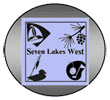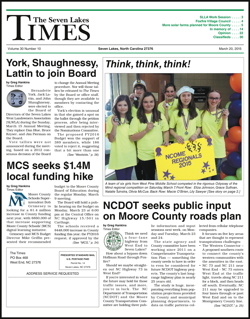 Westsiders have voted by a margin of more than seven to one to support a decision by the Seven Lakes West Landowners Association [SLWLA] Board of Directors to permanently close the road over Lake Auman Dam to vehicular traffic. When the final tally was taken at a Tuesday, December 15 Special Meeting of the membership, there were 473.5 votes in favor of supporting the Board's decision, 65 against, and 10 abstaining or expressing no preference.
Westsiders have voted by a margin of more than seven to one to support a decision by the Seven Lakes West Landowners Association [SLWLA] Board of Directors to permanently close the road over Lake Auman Dam to vehicular traffic. When the final tally was taken at a Tuesday, December 15 Special Meeting of the membership, there were 473.5 votes in favor of supporting the Board's decision, 65 against, and 10 abstaining or expressing no preference.
[It is possible to have a half-vote because each of the owners of a lot shared for septic field purposes pays half dues and receives a half vote.]
The meeting attracted approximately two hundred members, but the real story was the number of proxies held by SLWLA President Ron Shepard. Proxies are legal documents that allow a member to assign his or her vote to someone else. The Westside Board, after turning the administration of the Special Meeting over to their outside legal counsel, engaged in an aggressive campaign to persuade members to assign their votes to Shepard, using email, the Association website, and the landowners office staff to collect proxies.
As a result, Shepard walked into Tuesday's meeting with 418.5 votes sewn up -- more than three-quarters of the votes ultimately cast. In fact, the meeting was able to proceed only because the Board decided to include Shepard's proxies in the quorum count. Without them, the official headcount at the meeting for determining a quorum would have been only the 120 members who showed up without already having assigned a proxy -- a total more than fifty short of a quorum.
Dam Road Group outgunned in proxy fight
By contrast, the Dam Road Group, which had collected more than 200 signatures to call the meeting in the first place, never managed to get off the ground with its own proxy drive.
Westsider Mike Gorenflo, who organized the special meeting petition drive, asked in an email not to be designated as proxy for Dam Road Group supporters, indicating that his goal of ensuring a vote of the membership on the dam road closure had been fulfilled once the meeting was called. Apparently, no one stepped in to fill Gorenflo's shoes, leaving the Dam Road Group seriously outgunned in the proxy fight.
SLWLA Legal Director Ed Silberhorn told The Times that the Board could have stopped the meeting almost before it got started by simply pocketing the proxies Shepard held, leaving those members out of the quorum count.
"The Board decided in advance that we were going to go ahead and vote our proxies in favor of having the debate," Silberhorn said, "because we wanted to have the open debate and conversation that we had.
Bud Sales' motion opens debate
That debate opened with a motion by former Board member Bud Sales to support the Board's decision to close the dam road to vehicular traffic. Former Treasurer Kathy Kirst seconded the motion, and meeting moderator Palmer Suggs, of the law firm Robbins May & Rich in Southern Pines, opened the floor for comment.
Sales said the community had been debating the closure of the dam road for three years or more, and now knows, from the results of a survey circulated by the Board, that an overwhelming number of members supports the Board's position.
"We have wasted enough time and money on this," Sale said. "Let's move on."
Kirst offered members who attended the meeting a brief history lesson, explaining that Dam Engineer Dam Marks first advised closing the roadway over the dam in 2007, when water seeping through the dam saturated soil on the backside of the structure, threatening its integrity. The issue is not the road, Kirst said, but the safety of the dam.
"There has been talk about getting a second opinion," Kirst said. "But what happens if it doesn't agree with Dr. Marks' recommendations? And how do you take away the stated opinion of Dr. Marks that the dam shouldn't be opened?"
A dozen speakers weigh in
Members were asked to sign up in advance if they wanted to speak during the meeting, and Attorney Sugg moved methodically through the list of eleven, then opening the floor to additional speakers.
"When the road was first closed, I screamed like a stuck pig," said Scott Duval, a resident of Banbridge Drive near the western end of the dam, told the meeting. But he added that he feared the Board could spend millions of dollars developing and then implementing an alternative engineering solution that would allow the dam road to be reopened. "I'd rather see the money spent on plans to really beatify this community," Duval concluded, noting that effort would likely have a greater positive impact on property values.
Patty Cleary asked that the Board determine the cost of the special meeting process and make that information public.
"We've listened to rhetoric for months and months, a lot of deceit, and lot of scare tactics," Robert Campbell said. Noting that he was principally concerned about the continued safety of the dam, he added, "What will it cost for us to have another opinion, or two, or three, whatever it takes? Are we putting all our eggs in Marks' basket? I think we are."
"More than anything else I am saddened by the fact that we have come to this point over this issue," Wendy Fisher said. A resident of Longleaf Drive, she said traffic by her home had doubled -- and the speed of that traffic had increased -- after the dam road closure. "That affects the property value of my home," she said.
Dale Erickson said he was defending the dam, Dr. Marks, and the Board. "The dam was never designed for road traffic," Erickson asserted, noting that it has, over the past ten years, been used by all manner of heavy truck traffic. "Now that remediation is complete, we must vigorously defend the dam," he said. Failing to support the Board's decision could lead to additional costs, a sullying of the community's reputation, the possible involvement of state regulators, and more unrest in the community, he added.
Judy Pendleton said the Board, in closing the Dam Road, has not made adequate provision for alternative access to homes that lie west of the dam if an emergency should close Longleaf Drive for any period of time.
Acknowledging that she was among the minority in the room, Maureen Mead said, "All we asked from the beginning is that the Board involve us. And they haven't." She said the options for the dam road should have been studied more."I think we deserve a voice," she added.
Using a collapsible carpenter's rule as a prop, Fred Allen, drawing on his experience as a general contractor who has built earthen dams, explained that the forces that could undermine the dam are those that impact it from the side, not from above. "The road cannot compromise the dam," Allen said. "The dam could compromise the road."
Larry Greenburg said controversy over the dam road represented "the tyranny of the minority." "We are looking at a situation where neighbor continues to be bitter against neighbor," he said, "and that destroys the community, which is one thing that I have always loved about this place. To see this community become so divided and so divisive, that hurts me."
"This is not a waste," Mike Gorenflo said, defending the petition that called the Special Meeting. He said opposition to the Board's decision on the dam road had forced the Board to become more open to input and more willing to release information about the dam remediation and Marks' recommendations. "Hopefully what we got out of this is a Board that is going to think twice, before they make huge decision, to make sure the voice of the people is heard.
Jack Dumbleton, a resident since 1985 and an original organizer of the Association, asked members to support the Board's decision. His comments were echoed by Grace Kirkpatrick, also a resident since 1985, and a member of the original Westside Landowners Association Board of Directors. She said the Board "couldn't have been more open to the community" in the process of deciding what to do about the dam road.
Lewis Gregory, a former police chief of Whispering Pines, said his entire career had been spent in public safety and his support for the Board's decision to close the dam road was based on a concern for the safety of the public.
When they registered for the meeting, members were asked to declare whether they were in favor of the Board's decision, opposed to it, or undecided. After the speakers had their say, Sugg called a brief recess so that those who hadn't already declared a preference could register a vote, or others could change their vote, if they desired.
He then read the results, called for a motion to adjourn, and brought the West Side's second ever Special Meeting to a close.
